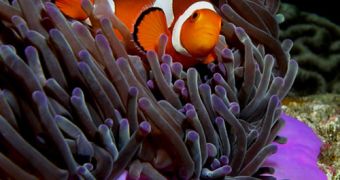According to the results of a new investigation, it would appear that baby clownfish are in danger of losing their hearing soon, due to the effects of ocean acidification. This would be disastrous for the species, since it uses hearing to avoid predators.
These fish need to avoid coral reefs during the day, since these areas teem with predators. As such, the creatures use hearing to stay safe. But ocean acidification is making it increasingly difficult to hear.
At the same time, the vast amount of noise pollution that is affecting the oceans is also hampering with this ability, but in other species as well. The latter include whales and dolphins too, experts say.
Within the next few decades, University of Bristol investigators add, clownfish could no longer be able to hear what's going on around them. The work was conducted together with colleagues at the James Cook University.
Ocean acidification is a process that leads to the lowering of the world ocean's pH levels. This means that the waters turn more acidic than usual, threatening everything from large mammals to species depending on coral reefs, and the corals themselves.
The phenomenon is caused by the fact water tends to absorb carbon dioxide from the atmosphere. When this happens, part of the amounts drawn from the air are converted into carbonic acid, which is the element that causes the acidification.
Past studies have demonstrated that this process is causing many fish species to lose their ability to smell, but effects on hearing have not been documented before. Details of the new work appears in the latest issue of the esteemed journal Biology Letters.
Bristol School of Biological Sciences expert Dr. Steve Simpson – the lead author of the work – collaborated with colleague Philip Munday, a professor at the JCU, to conduct this investigation.
“We kept some of the baby clownfish in today’s conditions, bubbling in air, and then had three other treatments where we added extra CO2 based on the predictions from the Intergovernmental Panel on Climate Change for 2050 and 2100,” Dr Simpson explains.
“We designed a totally new kind of experimental choice chamber that allowed us to play reef noise through an underwater speaker to fish in the lab, and watch how they responded,” the expert adds.
“Fish reared in today’s conditions swam away from the predator noise, but those reared in the CO2 conditions of 2050 and 2100 showed no response,” Dr. Simpson explains.
“What we have done here is to put today’s fish in tomorrow’s environment, and the effects are potentially devastating,” the investigator concludes.

 14 DAY TRIAL //
14 DAY TRIAL //